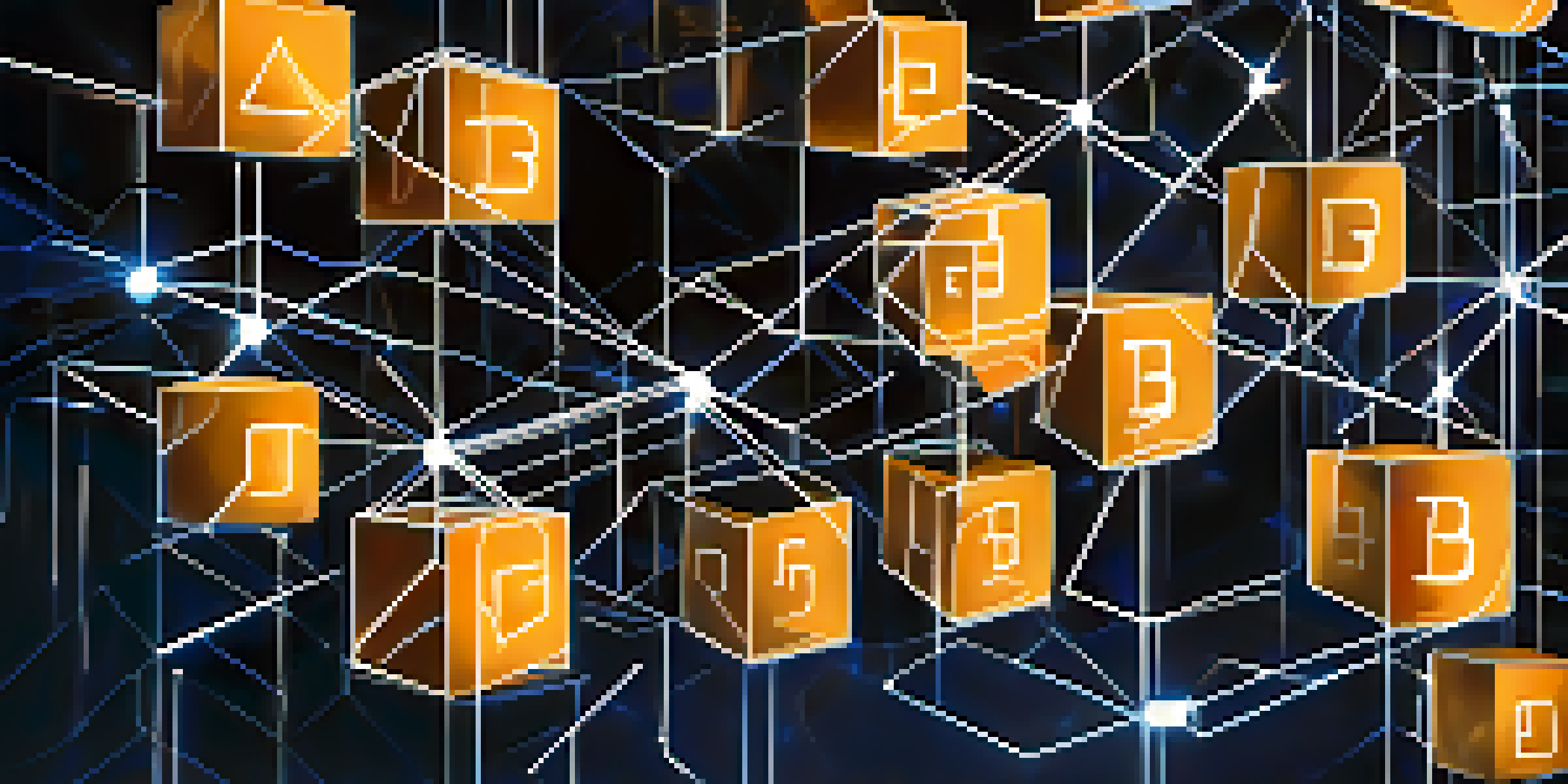Blockchain Technology: Transforming Work Contracts Forever

Understanding Blockchain: The Foundation of Change
Blockchain technology is a decentralized digital ledger that records transactions across many computers. This means that once a transaction is recorded, it cannot easily be altered, ensuring transparency and security. Imagine a shared notebook where everyone can see the entries, but no one can erase them. This inherent trust makes blockchain an ideal solution for managing work contracts.
Blockchain is the tech. Bitcoin is merely the first mainstream manifestation of its potential.
In traditional contracts, parties often rely on intermediaries, such as lawyers or banks, to verify agreements. Blockchain eliminates the need for these middlemen by providing a secure, transparent platform where all parties can independently verify the terms of the contract. This not only speeds up the process but also reduces costs associated with contract enforcement.
Moreover, the transparency of blockchain helps to build trust among parties who may not have a long-standing relationship. When everyone can see the same information, it minimizes the chances of misunderstandings or disputes. Essentially, blockchain transforms the way we think about trust in contractual agreements.
The Role of Smart Contracts in Automation
Smart contracts are self-executing contracts with the terms of the agreement directly written into code. They automatically execute actions when predetermined conditions are met, eliminating the need for manual oversight. For instance, a smart contract could automatically release payment once a freelancer submits their work and it meets specified criteria.

This automation not only saves time but also reduces human error, making the contract process more efficient. Picture a vending machine: you put in your money, make a selection, and get your treat without any human interaction. Smart contracts operate in much the same way, ensuring that agreements are honored without the need for third-party intervention.
Blockchain Enhances Contract Trust
Blockchain technology fosters transparency and security in work contracts, eliminating the need for intermediaries.
Additionally, smart contracts can adapt to various industries, from real estate to supply chain management, streamlining operations across the board. By enabling automatic execution based on clear criteria, they offer a level of reliability and efficiency previously unattainable in traditional contract management.
Enhanced Security: Protecting Sensitive Information
One of the standout features of blockchain technology is its robust security. Each block in the chain contains a unique cryptographic hash of the previous block, creating a secure link that is virtually tamper-proof. This means that altering any single block would require changes to all subsequent blocks, making fraud incredibly difficult.
Smart contracts can automate workflows and enable new business models, unlocking opportunities for efficiency and innovation.
For work contracts, this level of security is invaluable. Sensitive information, like payment details or proprietary data, is protected within the blockchain. It’s akin to having a vault with multiple locks—only those with the key can access the contents, ensuring that only authorized parties can view or alter the contract.
Furthermore, the decentralized nature of blockchain means that there is no single point of failure. In traditional systems, a data breach can expose sensitive information, whereas blockchain stores data across a network of computers, making it much harder for malicious actors to compromise. This resilience enhances trust in the contractual process.
Cost Efficiency: Saving Money and Time
Implementing blockchain technology can lead to significant cost savings for businesses. By reducing the need for intermediaries and streamlining processes, organizations can allocate resources more efficiently. For example, companies can save on legal fees and administrative costs associated with contract management.
Additionally, the speed at which blockchain can execute contracts means that businesses can respond to market demands more rapidly. When contracts are automated and self-executing, tasks that once took days or weeks can be completed in mere minutes. Imagine a fast-food restaurant where your order is processed and ready in record time—this is the kind of efficiency blockchain brings to contract execution.
Smart Contracts Automate Processes
Smart contracts execute agreements automatically, reducing human error and speeding up contract fulfillment.
Over time, these savings can accumulate, allowing companies to reinvest in growth and innovation. By adopting blockchain technology, organizations not only streamline their operations but also position themselves for long-term financial success.
Global Reach: Breaking Down Barriers
Blockchain technology transcends geographical boundaries, enabling businesses to engage in global contracts seamlessly. In traditional systems, international contracts often involve complex regulations and fees, making cross-border transactions cumbersome. Blockchain simplifies this by providing a universal platform that all parties can access.
For instance, a freelance graphic designer in Brazil can easily enter into a contract with a company in Germany without worrying about currency conversion or legal discrepancies. The smart contract can automatically convert payments and comply with local regulations, creating a smoother transaction process. It’s like having a universal translator for contracts, breaking down language barriers and making global collaboration easier.
This global accessibility not only opens up new markets for businesses but also fosters international partnerships. Companies can now collaborate without the limitations traditionally imposed by distance, creating a more interconnected world of work.
Regulatory Challenges: Navigating the Landscape
While blockchain technology presents numerous benefits, it also faces regulatory challenges that companies must navigate. Different countries have varying laws regarding digital contracts and blockchain usage, leading to potential legal complications. Businesses must stay informed about these regulations to avoid pitfalls.
For example, some jurisdictions may require specific licensing for blockchain-based contracts, while others may not recognize them at all. It’s essential for companies to consult legal experts to ensure compliance and mitigate risks. Think of it like a road trip: you need to know the rules of the road in each state you pass through to avoid getting pulled over.
Global Collaboration Simplified
Blockchain breaks down geographical barriers, enabling seamless international contracts and partnerships.
Despite these challenges, many governments are beginning to recognize the potential of blockchain and are working towards more inclusive regulations. As the technology matures, we can expect clearer guidelines that will facilitate its adoption, allowing businesses to harness the full potential of blockchain for work contracts.
The Future of Work Contracts: Embracing Change
As more companies begin to adopt blockchain technology, the landscape of work contracts is set to evolve dramatically. The shift towards digital, automated contracts is not just a trend; it’s a reflection of the changing nature of work in a digital age. Organizations willing to embrace this change will likely gain a competitive edge.
Imagine a future where contracts are created, executed, and enforced without any human intervention. This could lead to faster project turnarounds and improved collaboration between teams. The possibilities are as exciting as they are transformative, paving the way for innovative business practices.

Ultimately, the adoption of blockchain technology in work contracts is about more than just efficiency; it’s about fostering a culture of trust and transparency. As organizations recognize the benefits, we can expect a widespread shift towards blockchain, revolutionizing the way we engage in work agreements.